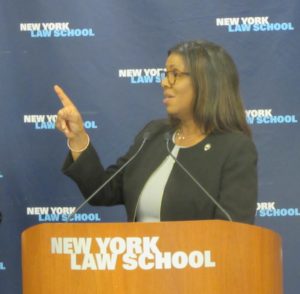
CityLand
New Yorkers will now have access to detailed information on individual landlords in the City. On December 19, 2017, Public Advocate Letitia James’s legislation to create a centralized database on New York City’s landlords was passed unanimously in the New York City Council.
The database will contain detailed information on individual landlords including a landlord’s portfolio of owned buildings, penalties against a specific building, number of NYC Housing Preservation and Development (HPD) violations against the landlord and their properties, and pending HPD orders on each property. With this database, tenants have the tools and resources to hold landlords accountable. The bill continues the Public Advocate’s work on creating transparency for New Yorkers and their landlords and to empower tenants to protect their housing rights.
Public Advocate James stated that “[t]ransparency is vital for New Yorkers seeking to hold unscrupulous landlords accountable…[and the] bill will create an easy-to-use database that allows tenants to identify patterns of abuse and harassment by landlords across buildings, further empowering and protecting tenants” and further emphasized this commitment to expanding tenants’ rights in her inaugural address on January 1, 2018.
The creation of the database stems from the lack of individualized tenant information on the current HPD database. Many tenants like Nancy Sher of 125 Court Street, who testified at the public hearing on November 22, 2016, were being overcharged for rent by landlords who used falsified information to raise rent rates. Yet, often times, tenants do not have access to information on the landlords and individual violations to use as evidence for their cases. Sher testified that her apartment unit had C violations and these violations could not be found on the HPD website. Meanwhile, the developers who owned 125 Court Street were qualifying for tax benefits and have changed rent regulations at Division of Housing and Community Renewal (DHCR). Because HPD did not have this record of the violation, it made it easier for the developers to say that repairs were made and the building was free of violations. Sher’s testimony showed evidence of how the lack of information on landlords make it easier for landlords to take advantage of tenants and their rent rates.
In response to the bill’s passing, two of the bill’s co-sponsors, Council Member Margaret S. Chin and Council Member Helen Rosenthal, acknowledged the database’s importance in providing transparency and its ability to provide New Yorkers with the tools to hold landlords accountable and to protect tenants’ rights. The bill has also received praise from the Legal Aid Society who recognizes Public Advocate James for “championing [the] measure.”
This bill is Public Advocate James’s ninth bill passed since taking office in 2014 and has been sent to the Mayor for his approval. The database will be found on the HPD’s website.
Click here for the press release and click here for the text of the bill.
By: May Vutrapongvatana (May is a CityLaw Intern and a New York Law School Student, Class of 2019.)

